UN watch Oct 2016
Human Rights foundation -Javier El Hage and UN Watch= Hillel Neuer with Irwin Colter of Raoul Wallenberg center for Human Rights at press conference in UN headquarters Peace and justice …







Human Rights foundation -Javier El Hage and UN Watch= Hillel Neuer with Irwin Colter of Raoul Wallenberg center for Human Rights at press conference in UN headquarters Peace and justice …







The Drug-Free World New York chapter takes June by storm with events across the city from the Puerto Rican Day Parade, to the United Nations, to a Heroes Awards Gala and more.
To say that our New York Drug-Free World (DFW) chapter has been busy is an understatement. When the US Department of Health and Human Services declares the opioid epidemic a public health emergency, there is no time to rest.
June 2018 is but one example of their tireless work. It all started with a Drug-Free Basketball Tournament at the Medgar Evers College in Brooklyn, co-hosted by Bobby “Zorro” Hunter, Chairman of the Retired Harlem Globetrotters.
Next came the 11th Annual Drug-Free Heroes Awards Gala, recognizing 15 awardees for their dedication to drug education. They included members of the New York Police Department, a New York state trooper, Miss New York and others. .. with Hugues SANON/ Ambassador for a Drug Free world and Human Rights advocate joined State …
On its heels followed the 2nd Annual Truth About Drugs Concert in Brooklyn’s Canarsie Park, joined by the nonprofit My Time Inc., the Speak Life Tour, the local New York Police Department and various artists.
On that same day, held at the United Nations was the International High-Level Conference on Drug Education, Sports and Cultural Empowerment, sponsored by the Permanent Mission of Senegal and the International Human Rights Commission. Also speaking was General Edwin Najera, Director of DFW Guatemala, officials from New York City and more.
When the US Department of Health and Human Services declares the opioid epidemic a public health emergency, there is no time to rest.
But in the city that never sleeps, they rolled right into a Drug-Free World float in the Puerto Rican Day Parade, joined by the Harlem Wizards and Miss Manhattan, Michelle Ley. The Wizards performed basketball acts with the crowd and 4,000 The Truth About Drugs booklets were distributed along the way.
The Institute of Noahide Code INC proposes a strategic alliance with the United Nations post 2030 agenda to promote the codification into national legislation of the United Nations resolutions on the culture of peace, environmental ethics and social justice. The Institute of Noahide Code recruits parliamentarians from all United Nations member states who share the goal of implementing these United Nations resolutions into national legislation by providing model draft legislation, initiating workshops and conferences and creating alliances with religious leaders, media and academic leaders and business executives who support and supplement the legislation by teaching, publicizing and putting into practice the “global ethics” inherent in these United Nations Resolutions.

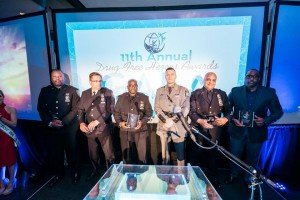
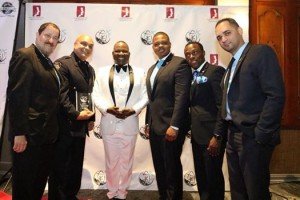
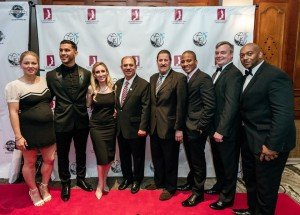

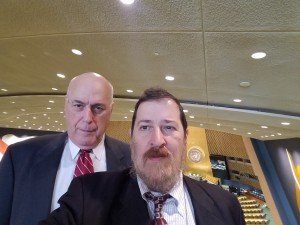

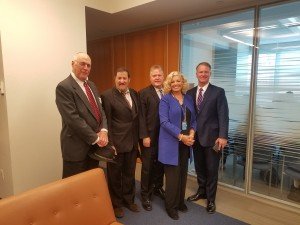
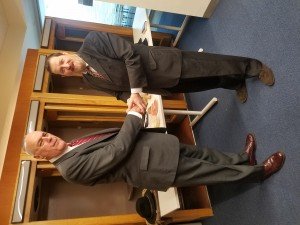

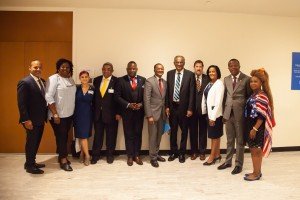
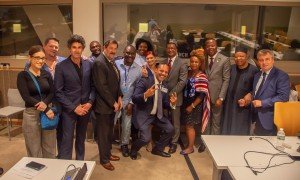
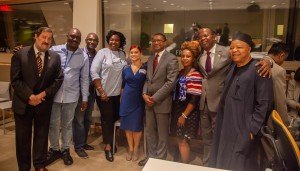
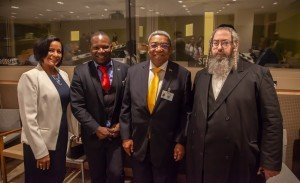

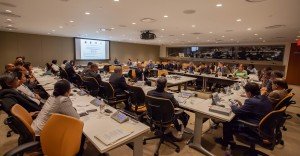
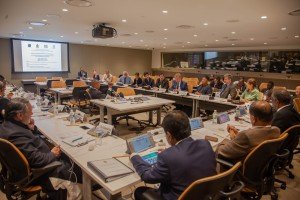


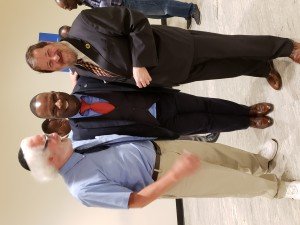
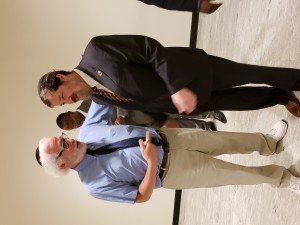






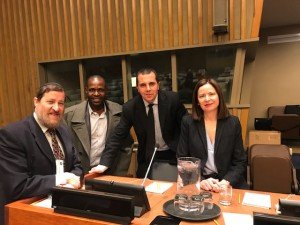


![]()





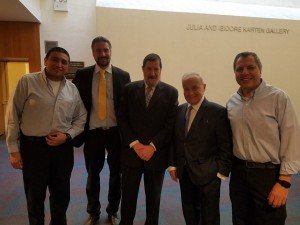
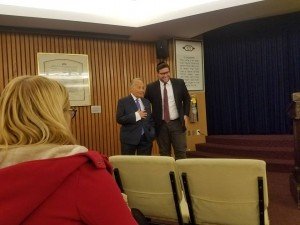
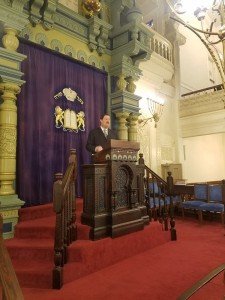
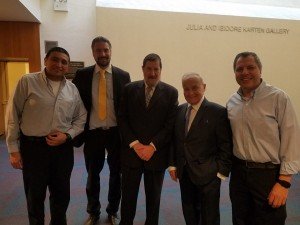
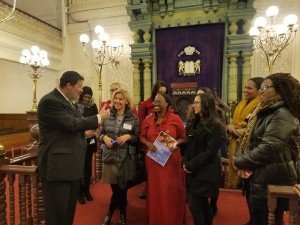
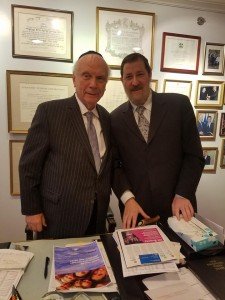
For Immediate Release:
12/06/18
The first ever Menorah lighting at the United Nations was organized by Rabbi Yakov David Cohen, Director of the Institute of Noahide Code the sponsoring UN NGO, said “I am heartened coming into the United Nations Headquarters with the Isaiah Wall which prophesies that “no nation will wage war against another nation, and the swords will be transformed into plowshares.” This historic event involved the lighting of the Menorah by Rabbi Elie Abadie at the Isaiah Wall. The menorah is lit to commemorate religious freedom, when a small Jewish army fighting for religious freedom defeated the mightiest empire of the time: The greeks, who were attempting to quash religious observance. During the lighting the names of the 11 Jews killed during the Pittsburgh synagogue massacre were read, then Rabbi Cohen spoke about “The fifth night of Hanukkah is the first night in which a majority of the lights on the Menorah are lit, this is the night in which the light overcomes the darkness, it is up to all of us whether Jewish or Gentile, White or Black, Hispanic or Asian, to add in light and make this world a better place. Then participants danced and sang traditional Hanukkah songs including “Maoz Tzur”.
Then The Grand Chanukah Ball was held at the UN express Bar just steps away from the general assembly hall, in attendance were Ambassadors and UN staff. NYC advocate Clark Pena Received the Ambassador of peace award for his work on peace. Then Mr. Pena presented Rabbi Cohen with a proclamations from the New York State assembly as well as from New York City Council recognizing Rabbi Cohen’s work on promoting peace and unity in the world.
The United Nations acknowledges human rights as well as humanity’s right to freedom, including that of religion. This Menorah lighting ceremony was open to all, including visitors to the United Nations of all races, religions and ethnicities. It was a celebration of all that unites us as human family that we are: our yearning for ever more light at a time that humanity hopefully emerges victorious with light over darkness, the forces of human rights and freedom successful over intolerance, and the ideals of the Noahide Laws prevailing throughout the world. The Seven Universal Laws of Noah are means by which humanity strives to live in unity and peace. These laws for peace and unity encompass respect for G-d, for human life, respect for the Family, for other people’s property, the creation and respect of a judicial system, and respect for all creatures and environment.
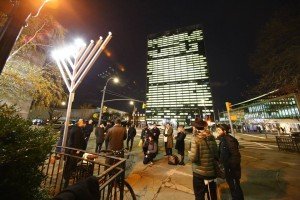
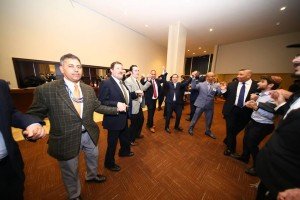
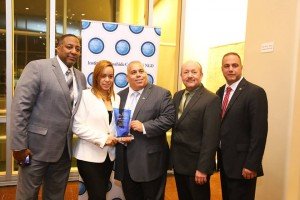
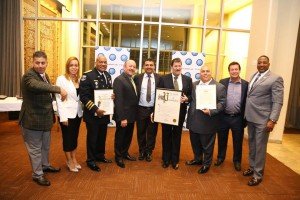
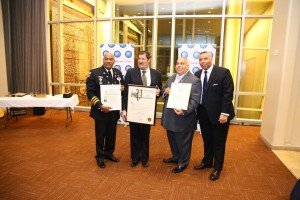
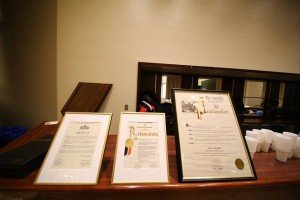
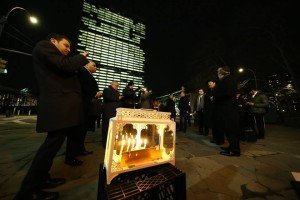
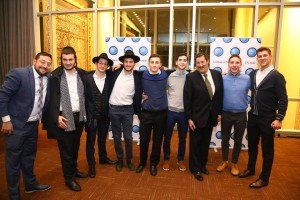
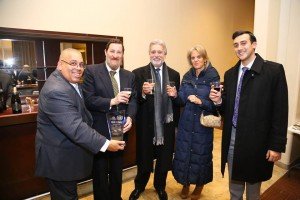
B”H
The Institute of The Noahide Code at the United Nations has been especially active in 2018 throughout New York, Washington, and The United Nations. In a special meeting on the 38th floor of The United Nations Headquarters, Rabbi Yakov D. Cohen, Founder and Executive Director of the Institute, met personally with the Secretary General of the United Nations, Mr. Antonio Guterres. The meeting was arranged to fall on Shushan Purim, after a historic and first time Megillah reading and Purim party at the UN Headquarters. The Megillah attracted a myriad of UN employees, diplomats and members of the media, as well as those working for UNICEF, who attended to listen to the story of Cyrus’s family set in the land known as current day Iran.
It was interesting to see that the employees working for UNICEF, as well as other UN employees, listened to the Megillah reading, in particular and according to Wikipedia: “In recent years, the Middle East was the subject of 76% of country-specific General Assembly resolutions, 100% of the Human Rights Council resolutions, 100% of the Commission on the Status of Women resolutions, 50% of reports from the World Food Programme, 6% of United Nations Security Council resolutions and 6 of the 10 Emergency sessions.”
The story of the Megillah takes place all over again throughout the world, wherever a Jew stands in the midst of all the other nations, and is constantly signaled out as such, and in the case of the United Nations, constantly diplomatically sanctioned. But the Megillah also offers the lesson that Rabbi Mordechai gathered children to pray, thereby getting parents and families involved in doing good and saving the world while saving his own people. That story, has resonance in the halls of the United Nations, where such emphasis is placed on the welfare of children, of families wrought apart by strife and war, and violence, where the hope resides in saving children, to save the world.
As a foundation for the meeting with Secretary General Antonio Guterres, for Jews at the United Nations there was light, joy, overt happiness and honor. The Secretary General was extremely happy to meet with Rabbi Cohen, and acknowledged Rabbi Cohen’s efforts to shed light among those who transit through the UN. Both gentlemen spoke about the Isaiah Wall in front of the United Nations where it clearly states the time when people will ‘bet their swords into plowshares’. The Rebbe Rabbi Menachem M Schneerson referred in January of 1992 that the arms reduction agreement between the former USSR and the United States, particularly meant that Isaiah’s prophecy was coming to fruition.
It was in that very site of Isaiah’s Wall, that for the first time, a Mehorah was lit during Chanukah. Illuminating the steps that connect First Avenue up to the leafy and beautiful NYC enclave known as Tudor City, the Menorah had as witnesses to its initial 2017 lighting, Ambassadors from Ukraine, Uruguay and the United States, as well as representatives from Azerbaijan, Canada and Slovakia, among others. For eight days, a beacon of light -and victory for the Jewish people- could be seen from any floor of the United Nations Headquarters. That there was sufficient oil to last eight days in the initial Chanukah story paralleled in 2017, that there was sufficient respect among the nations to value and to enjoy the light glowing from each additional lit lamp. An everlasting symbol of Judaism stood tall and erect in front of a huge building where 193 countries often convene, to discuss how to put an end to poverty, to put an end to war, to teach people to live in peace with one another, how to uphold peace and security.
The Universal Noahide Code “UNC”, setting forth to the international diplomatic and religious community what philosopher Hugo Grotius cited as the basis for the 1945 United Nations Charter and thus, the cornerstone of all international law. Grotius further pointed out that the “UNC” is the practical means, by which humanity may strive to live in unity and in peace and can thus fulfill its potential to see all the families of the earth blessed. These laws of peace and unity encompass respect for G-d, for human life, respect for the family, for other people’s property, for the creation, respect for judicial systems plus respect for all creatures and the environment.
A day does not go by that someone at the United Nations and its corridors, does not approach Rabbi Cohen first just to say hello. It is after all, not usual to see a Rabbi transiting through the building. From the initial encounter, the Rabbi hands over to the person a ‘good card’, which reflects the Universal Noahide Code. During a recent encounter, a man said after hearing what the Codes entail: ‘I could live by that’. Just as Jews were able to be redeemed from Egypt and to this day is an ongoing and dynamic process, humankind too, shows its need to leave the constraints of everyday life and society, and to be elevated spiritually, to know its Creator. The Noahide Codes do serve as a bridge to unite humanity, for peace and unity and love. There is no better place to evidence this, as the United Nations: a place which has a unique calling to beat their swords -and hate- into plowshares, transforming humanity into brotherhood, to a time when the whole world will only know Him.

No child should leave Lunchroom or enter a classroom hungry:
Political, civic, and religious leaders from across the spectrum have united in a groundbreaking effort to secure school lunches that meet the religious requirements of the diverse population in New York City’s public schools.
September 6th, 2016 at 12 noon at the steps of Manhatten’s City Hall will host a dynamic gathering of top leaders to push proposed Senate bill S1032 to ensure the availability of Halal and Kosher lunches for every school that hosts twenty-five percent or more students from a faith community that has dietary restrictions.
Senator Tony Avella (D-QUEENS) is credited with pioneering this effort. He shares, “The population of residents in cities like New York City who practice a religious faith with specific dietary restrictions is rising….Offering students these types of food options during lunch not only accommodates their dietary restriction but also enhances students’ awareness and respect for diversity in cultures, religions, and ethnicities.” Another active contributor is Assemblyman William Colton (Brooklyn), “as a former teacher, I understand the importance of ensuring the proper and healthy nourishment of children to educational progress. I have cosponsored two legislative bills (A8474, Ortiz & A 4328 Sepulveda) to provide for such needs.” Hailing these efforts as basic to American democracy, Assembly member Jaime R. Williams (District 59 Brooklyn)states, “To be without such food due to governmental agencies not considering important religious ideals is contrary to all our great beliefs of our City, State and Nation. Diversity of our religions has always been a cornerstone of our democratic system and that is why I support and urge others to support the mandate that no child should leave a
lunchroom or classroom hungry.”
Awareness for this pressing need was galvanized by Mazeda Uddin, Muslim woman activist and humanitarian,founder of the S.A.F.E.S.T. advocacy organization and leader in meeting the needs of immigrant populations from
all over the world.
Mazeda Uddin reflects, “Often these children go to bed hungry because they did not eat a good diet during the day.The parents of many of these children are on minimum wage trying to make ends meet and struggling to give their
children a proper diet on a daily basis.”
This proposed bill is hailed as a testimony to the tolerance and diversity of New York City; at the forefront of world leadership in finance and culture, now the city is trailblaizing efforts at true coexistence. State Senator Jose Peralta (D-Queens) remarked, “I want to thank the South Asian Fund for Education, Scholarship and Training in its efforts to bring Halal and Kosher menus school cafeterias.” Adding his support, State Senator Jesse Hamilton said, “Our public schools must be sensitive to the needs of every student, so providing kosher and halal meal options to students is imperative. I urge the Department of Education to act promptly to ensure that no student goes hungry.” because of their religious background.”
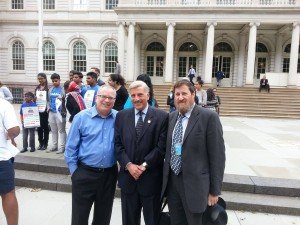
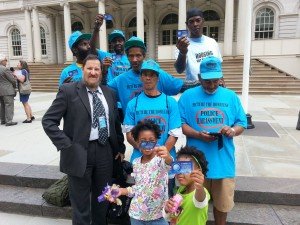
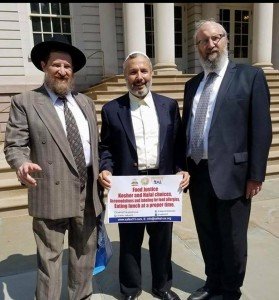
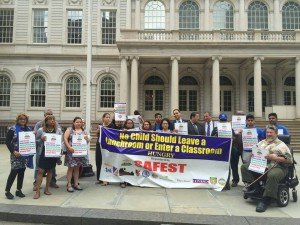
THE INTER-PARLIAMENTARY COALITION FOR GLOBAL ETHICS
SEPTEMBER 4, 2018/ UN Headquarters, New York
SUMMIT OF PARLIAMENTARIANS AT THE UNITED NATIONS
The Role of Parliaments for Promoting the Culture of Peace and Implementing the SDG’s
Co-sponsors: UNESCO, Missions of Sri Lanka, Benin,
Civil Society Representatives:
Imam Agha Jafri/ Sec. Gen. -American Muslim Congress
Rabbi Yakov David Cohen, Pres. Institute of Noahide Code
Rev. Tomas de Valle, St. Colomba
Mark Weizman, Director of Government Affairs/ Simon Weisenthal Center
Sergio Kopeliovich, Founder/Director, New York City Peace Museum
10 30 2018
Universal Noahide Laws at the UN
One man had a dream once, that his children will one day live in a nation where they will not be judged by the color of their skin, but by the content of their character. This dream was born out of the ashes of a crumbling belief that one man was worth more than another. This misguided idea, that a free man was still subject to the will of his former masters, was and still is a microcosm of a problem that is facing the world today.
The prejudice, bigotry, violence and wickedness that infects every nation is the result of a lawlessness born out of our tendency to forget our past. The nations of our planet face daily battles between people whose only real fault is ignorance of the laws given to mankind since the time of Adam. These forgotten laws are known as the Universal Noahide Laws and are ostensibly a paragon of ethical behavior meant to guide mankind to perfection through good deeds and to propagate knowledge and understanding of the Divine.
It should be the dream of all people that our children should not only live in a nation where they will not be judged by the color of their skin, religion or social status, but that they should live in a nation that adopts these Universal Laws as the foundation of the existence of that nation.
In 1945, the United Nations was established to promote international co-operation as well as to create and maintain international order. The original 51 member states began with a vision that all nations, great and small, would benefit from a conglomerate of working together in their efforts to foster social and economic development, provide humanitarian aid, promote human rights and maintain peace between all nations. Today, over 190 countries have joined this international body in hopes that the infrastructure of peace lies within.
One of the principal organs of the UN is the Economic and Social Council, or ECOSOC. This 54 member council serves as a forum for discussing international economic and social concerns, as well as delivering recommendations regarding policy to be addressed to the entire UN body. ECOSOC deliberates with many non-governmental organizations , or NGO’s, that participate in the day to day activities of the UN. The Institute of Noahide Code-UN is an accredited NGO with consultative status promoting peace through the values set in place by the seven Universal Laws. These laws are the Key to opening up a dialog between people of all nations, regardless of creed, religion or social class. They represent the common bond of all people across the globe, the backbone of peace. These laws are the framework for building a bright future for our children.
The foundation for establishing these Universal Laws at the UN is already in place due to the tireless efforts of Rav Yakov D. Cohen, executive director of the Institute of Noahide Law. As our generation witnesses the moral decay of the society around us, like what the world recently witnessed in Pittsburgh, Pennsylvania, it becomes a moral issue whether or not to become proactive in stopping this burning hate that is festering in regions all over the world. We are beginning to forget the lessons that we learned from the Holocaust, which included the greatest lesson, that even discrimination against one group of people will result in the unraveling of the fabric of our entire society.
If we forget those lessons, if we forget our past, if we forget the Universal Laws, then our dreams of a utopia world for our children will fade away and be forgotten. These lessons, laws and future go hand in hand. In order to make peace between all nations, then all nations must realize that it is time to stop dreaming and embrace our reality. All of our lives depend on the choices we make from moment to moment. Each new moment provides us opportunities to change who we are. Now is the time to make the Universal Noahide Laws a priority.
When enough people recognize the importance of the Universal Laws, people and nations can truly begin the healing process all over the world with a common goal of providing our children with their own moments and chances to build a future for their children, our grandchildren. If we lose sight of our responsibility to pass on the knowledge of these laws to the next generation, we forfeit our future.
By: Craig R. Lodice
. . TOLERANCE AND SOLIDARITY . .
An article from Cotidianul (abridged)
At the UN headquarters in New York on September 14, the conference entitled “Inauguration of the Parliamentary Multi Track Initiative Council for the SDG’s and the Culture of Peace” was organized by the Inter-Parliamentary Coalition for Global Ethics. Emil Constantinescu [former President of Romania] was the chairman of the conference and gave the opening speech entitled “Global Peace Initiative from the Levant, the foundation for a new culture of peace,” his press office announced in a statement.
Romanian
The presidium of the conference included Ambassador Ion Jinga, Permanent Representative of Romania to the United Nations, Ambassador Katalin Bogyay, Permanent Representative of Hungary to the United Nations, Lily Valchanova Liaison Officer UNESCO, Garry Jacobs, president of the World Academy of Art and Science and the World University Consortium, and S. Bekerman, secretary general of the Interparliamentary Coalition for Global Ethics.
Participants in Sessions 1 and 2, led by President Constantinescu included Giandomenico Picco, former Under-Secretary General of the United Nations and adviser to the Oxford Research Group, Master Jun Hong Lu, president and director of the Oriental Media Buddhist Association, Rabbi Elie Abadie, Director of the Jacob E. Safra Institute of Sephardic Studies at Yeshiva University, Imam Agha Jafri, founder of the American Muslim Congress, Wafik Moustafa, president of the Conservative Arab Network, Dr. Lahoucine Khabid, president of the Atlas Center for Diplomatic Studies, ZH Khurram, secretary general of the International Youth Forum, Dr. Boris Pincus, President of Religions in Dialogue, and Rabbi Yaakov D. Cohen, founder of the Institute for Noahide Code. . .
Speech given by Emil Constantinescu:
Global Peace Initiative from the Levant, the foundation for a new culture of peace
At its annual conference in 2011 in Berlin, the Academy for Cultural Diplomacy launched a project for a new type of relations between nations and states based on understanding instead of military pressure or economic conditions. . . It seems that this kind of relationship that gives peace a chance in the globalized world can find inspiration in the ancient world of the Levant. This is not only because the Levant was the cradle of cultural diplomacy, but also because many civilizations including the Egyptian, Jewish, Assyrian, Babylonian, Phoenician, Greek, Arabic empires Roman, Byzantine and Ottoman empires were created in the Levant where they expanded exchanges of goods and ideas. South-East Europe has long been in contact with North Africa and the Middle East, and the people who live here have a long and extensive experience in intercultural dialogue.
In 2012, the Inter-Parliamentary Coalition for Global Ethics took up the initiative and expanded it globally. In 2013, at the end of the conference organized in Bucharest with a wide range of religious, academic and parliamentary representatives, a joint project was set up for the initiative. Considering that the Global Peace Initiative from the Levant could serve as a benchmark and model to achieve peace in all areas of conflict around the globe, on 24 and 25 June 2013, the Inter-Parliamentary Coalition for Global Ethics organized a conference at United Nations headquarters in New York dedicated to promoting this initiative. The Romanian Parliament endorsed it with a message of support.
Question for this article
Religion: a barrier or a way to peace?, What makes it one or the other?
In March 2014, the Inter-Parliamentary Coalition for Global Ethics organized a new conference in New York together with the Foundation for the Culture of Peace, headed by Federico Mayor.
It is planned to present the Global Peace Initiative from the Levant to the Congress of the United States, the British Parliament, the Knesset of Israel and to many other parliaments, including those of Japan and Palestine. . . .
This project, dedicated to promoting a culture of peace, invites the participation of researchers and scholars in the humanities, theologians, writers, artists, architects, musicians to build a space of knowledge and understanding through co-operation and mutual respect. A culture of peace is based on a new type of relations, not only between states, but especially between peoples who share common values that were born long before the current nation-states.
The time has come for cultural diplomacy and recognition of the old legacy of the Levant, an alternative reading of the history of this region, especially prior to the wars and conflicts of the present millennium. It offers a new approach, emphasizing what we have in common and what can unite us: principles, values and skills practiced in the past, that can now be harnessed to ensure not only the stability of this region as a whole, but also building a model of cooperation and trust for all countries. It does not mean that we should deny our past, but to assume it in its tragic dimension. . .
For quite some time international organizations such as UN, UNESCO and civil society have been trying to create a political culture of security through negotiation and cooperation. To promote peace and understanding in the world they have been looking for the lowest common denominator around which we can agree. It is a welcome step and especially in the face of the many immediate threats.
My belief is that we should propose much more. If we want to achieve true peace and understanding between people we should not focus on the lowest common denominator, but to refer to the highest common denominator – faith.
Modern and postmodern societies of the 20th century have promoted equal rights and freedoms regardless of racial and ethnic differences and equal opportunities for women. But all this tends to divide society rather than unifying it. A peace based on a common ideal would be ideal, although it is a difficult task, not a peace imposed under the pressure of fear, but a peace springing from the depths of consciousness of millions of people. The treasure of the philosophical, literary, artistic millenary history of the Levant can help inspire a spiritual revolution with a profound knowledge of the human being who has been torn for millennia in the struggle between the aspiration to love one’s neighbor and the tendency to use power to oppress them or to oppress others in their own interest. We can turn this vast pedagogy of suffering into a pedagogy of reconciliation.
Twenty years ago, millions of people in Eastern Europe with empty hands, were ready to fight and die for freedom and democracy against the greatest war machine in history. In a new millennium, we can rediscover faith. Not to use it one against another, as has been done throughout the long history of mankind, but to understand our purpose on Earth. Peace is the name of God, whether we are Christian, Muslim, Jewish or faiithful to Asian religions. Only human arrogance has made us forget the Lord’s message, whatever name we give it to him in the language or our faith.
If the Levant, the cradle of the great monotheistic religions, will carry out a political and visionary project adapted the great challenges of today, it will contribute not only to a new identity of the area, but also hdlp to create a different concept of the future world called into a new humanism.”.
Article from: http://cpnn-world.org/new/?p=7035